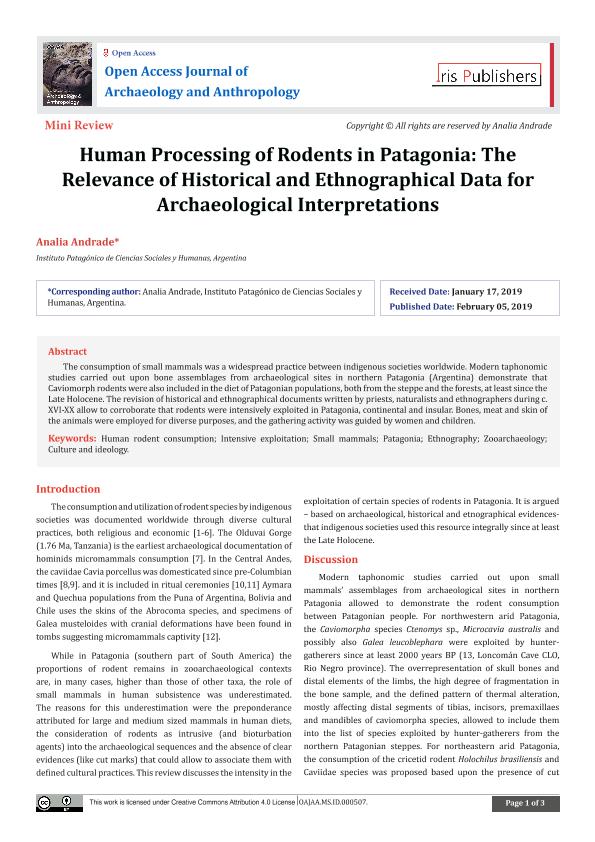Mostrar el registro sencillo del ítem
dc.contributor.author
Andrade, Analia

dc.date.available
2020-02-10T15:30:04Z
dc.date.issued
2019-02
dc.identifier.citation
Andrade, Analia; Human Processing of Rodents in Patagonia: The Relevance of Historical and Ethnographical Data for Archaeological Interpretations; Iris Publishers; Open Access Journal of Archaeology & Anthropology; 1; 2; 2-2019; 1-3
dc.identifier.issn
2687-8402
dc.identifier.uri
http://hdl.handle.net/11336/97053
dc.description.abstract
The consumption of small mammals was a widespread practice between indigenous societies worldwide. Modern taphonomic studies carried out upon bone assemblages from archaeological sites in northern Patagonia (Argentina) demonstrate thatCaviomorph rodents were also included in the diet of Patagonian populations, both from the steppe and the forests, at least since the Late Holocene. The revision of historical and ethnographical documents written by priests, naturalists and ethnographers during c.XVI-XX allow to corroborate that rodents were intensively exploited in Patagonia, continental and insular. Bones, meat and skin of the animals were employed for diverse purposes, and the gathering activity was guided by women and children.
dc.format
application/pdf
dc.language.iso
eng
dc.publisher
Iris Publishers
dc.rights
info:eu-repo/semantics/openAccess
dc.rights.uri
https://creativecommons.org/licenses/by/2.5/ar/
dc.subject
Human rodent consumption
dc.subject
Intensive exploitation
dc.subject
Small mammals
dc.subject
Patagonia
dc.subject
Ethnography
dc.subject
Zooarchaeology
dc.subject
Culture and ideology
dc.subject.classification
Otras Historia y Arqueología

dc.subject.classification
Historia y Arqueología

dc.subject.classification
HUMANIDADES

dc.title
Human Processing of Rodents in Patagonia: The Relevance of Historical and Ethnographical Data for Archaeological Interpretations
dc.type
info:eu-repo/semantics/article
dc.type
info:ar-repo/semantics/artículo
dc.type
info:eu-repo/semantics/publishedVersion
dc.date.updated
2019-12-11T18:53:08Z
dc.journal.volume
1
dc.journal.number
2
dc.journal.pagination
1-3
dc.journal.pais
Estados Unidos

dc.conicet.avisoEditorial
Open Access Journal of Archaeology & Anthropology (OAJAA) is a globally accepted journal that aims to publish innovative research developments promoting theoretical, methodological developments in the discipline of archaeology and anthropology. This journal includes ethnoarchaeological prospectives, digital heritage, archaeology, ancient history, architectural archaeology, cultural sustainability, astronomy in culture, historical archaeology, physical anthropology, new archaeological finds reports, critical reviews, numismatics, iconography, various scientific aspects including archaeobotany and archaeozoology, ethnography, cultural anthropology, Landscape, art history, Vernacular culture, introductory archaeology, historical anthropology, global history, and all aspects fall under the journal. OAJAA is a monthly published journal which provides a forum to submit their all types of articles like Editorial, Letter to Editor, Research, Review, Case Report, Short Communication, Perspectives, Mini Review, Opinion, e-books and Video articles etc.
dc.description.fil
Fil: Andrade, Analia. Consejo Nacional de Investigaciones Científicas y Técnicas. Centro Científico Tecnológico Conicet - Centro Nacional Patagónico. Instituto Patagónico de Ciencias Sociales y Humanas; Argentina
dc.journal.title
Open Access Journal of Archaeology & Anthropology
dc.relation.alternativeid
info:eu-repo/semantics/altIdentifier/doi/http://dx.doi.org/10.33552/OAJAA.2019.01.000507
dc.relation.alternativeid
info:eu-repo/semantics/altIdentifier/url/https://irispublishers.com/oajaa/fulltext/human-processing-of-rodents-in-patagonia-the-relevance-of-historical-and-ethnographical-data-for-archaeological-interpretations.ID.000507.php
Archivos asociados
